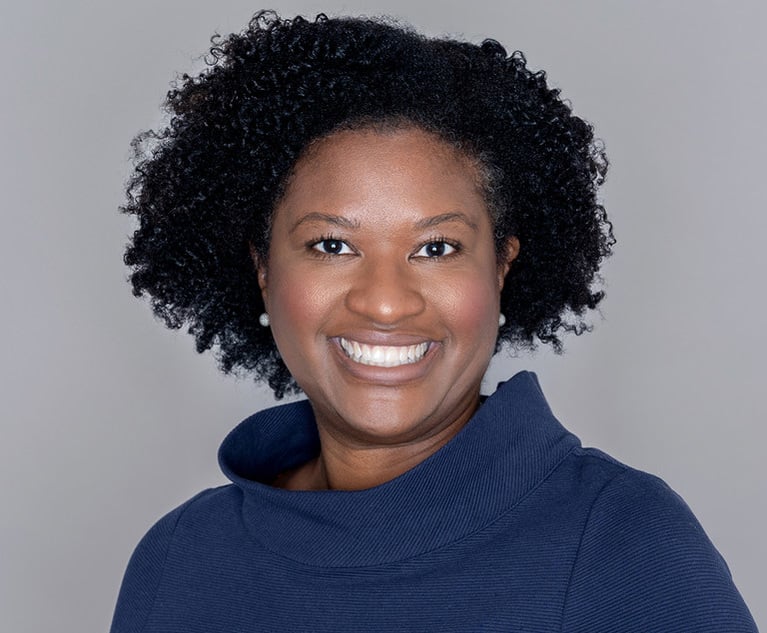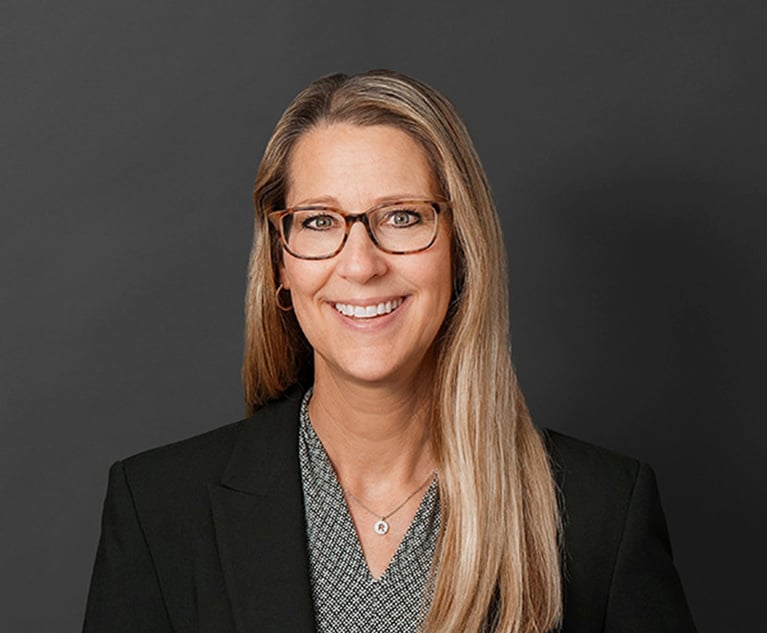Pa. Supreme Court Arguments on Strict Liability in Med Mal Exceeded Allocatur Grant, Attorney Says
Arguments before the Pennsylvania Supreme Court last month that delved into whether doctors should be held to a strict liability standard in medical negligence cases veered out of bounds, one of the attorneys who appeared before the justices is contending.
November 01, 2018 at 05:42 PM
5 minute read
 Photo: Shutterstock
Photo: Shutterstock
Arguments before the Pennsylvania Supreme Court last month that delved into whether doctors should be held to a strict liability standard in medical negligence cases veered out of bounds, one of the attorneys who appeared before the justices is contending.
Attorney Stephen Trzcinski, who argued for the plaintiffs in Mitchell v. Shikora during the Supreme Court's October argument session in Pittsburgh, has filed a post-argument application with the high court, saying opposing counsel focused arguments on issues that the justices had specifically declined to consider, and as a result, the justices should either dismiss the appeal as having been improvidently granted, or allow for more briefing and argument in the case.
Trzcinski filed the 10-page application with the high court on Tuesday, asking the justices for leave to more fully brief the issue.
“The court did not accept the question regarding strict liability,” Trzcinski said Thursday. “It was quite a surprise to me that the argument had so much traction during the oral arguments.”
Dickie, McCamey & Chilcote attorney John Conti, who argued before the justices on behalf of the defendant, disagreed, saying the issues addressed during the arguments flowed naturally from the Superior Court's opinion and the questions posed during the argument session.
“We would disagree that there was any issue raised or argued that was not part of the underlying decision or the appeal as it was accepted by the Supreme Court,” Conti said. “I think the evidence of that is manifest by virtue of the questions posed by the court.”
Mitchell stems from a 2012 hysterectomy that the defendant, Dr. Evan Shikora, performed on plaintiff Lanette Mitchell. According to court records, midway through the operation, Shikora suspected he had severed Mitchell's bowel, so he abandoned the hysterectomy and consulted a general surgeon, who repaired the bowel. Court records said Shikora nearly cut Mitchell's bowel in half.
Mitchell sued Shikora, alleging negligence, and later sought to exclude evidence about whether bowel injury was a known risk or complication of the surgery. Although the trial court did not allow in evidence related to informed consent, including conversations between Shikora and Mitchell or evidence of Mitchell's consent despite the risks, the jury was allowed to hear about the general risks and complications associated with a laparoscopic surgery.
The jury rendered a defense verdict, and Mitchell subsequently appealed, arguing that the court should not have included any information about the risks and complications. Last year, a three-judge panel of the Superior Court held that, even though the defendants argued the information was necessary to establish the standard of care, allowing in the evidence was prejudicial to the plaintiffs.
According to the post-argument filings, Shikora had asked the Supreme Court to grant an appeal on three issues: whether the Superior Court improperly re-weighed the evidence, whether the Superior Court's holding went against the Supreme Court's 2015 decision in Brady v. Urbas, and whether the Superior Court's had imposed a strict liability standard that had broad policy implication.
The post-argument application said that, although the justices only agreed to hear arguments about whether the Superior Court's holding had conflicted with Brady, defense counsel continued to argue about the strict liability standard.
In the filing, Trzcinski pointed to statements made during the argument session that he said indicated that the court felt that the only issue from Brady that was implicated in the appeal was dicta. And, if the court felt the language from Brady was dicta, there could be no conflict between the two cases, he argued, so the appeal should be dismissed.
Trzcinski further said the point he tried to make during the argument session was that the defendants failed to establish several underlying facts about how the surgery occurred, and so the risk and complication evidence the defendants sought to introduce did not apply to the facts that had actually been established at trial.
“Because there are alternative ground for affirming the Superior Court's decision, this court should leave the broader question for a more suitable case,” Trzcinski in the filing.
However, he said if the court wanted to go beyond the Brady issue, it should clarify what additional questions it would consider and allow for additional briefing and argument.
“Such relief is necessary to ensure that this court receives adequate adversarial briefing, which in turn will help this court reach a sound decision,” he said.
Appellate attorney Howard Bashman said the request is not common, but attorneys have made similar arguments in other cases. He cited one case he previously handled, where the plaintiffs repeatedly argued, during the briefing and oral argument stages, that the case did not present the issues that the court had agreed to consider. The justices eventually dismissed the case as having been improvidently granted after the argument session, Bashman said.
“Sometimes it will have the desired effect, even if it didn't have the desired effect immediately,” he said. “The approach here is certainly an understandable strategy.”
This content has been archived. It is available through our partners, LexisNexis® and Bloomberg Law.
To view this content, please continue to their sites.
Not a Lexis Subscriber?
Subscribe Now
Not a Bloomberg Law Subscriber?
Subscribe Now
NOT FOR REPRINT
© 2025 ALM Global, LLC, All Rights Reserved. Request academic re-use from www.copyright.com. All other uses, submit a request to [email protected]. For more information visit Asset & Logo Licensing.
You Might Like
View All


Penn State Dickinson Law Dean Named President-Elect of Association of American Law Schools
Trending Stories
- 1Pa. Superior Court: Sorority's Interview Notes Not Shielded From Discovery in Lawsuit Over Student's Death
- 2Kraken’s Chief Legal Officer Exits, Eyes Role in Trump Administration
- 3DOT Nominee Duffy Pledges Safety, Faster Infrastructure Spending in Confirmation Hearing
- 4'Younger and Invigorated Bench': Biden's Legacy in New Jersey Federal Court
- 5'Every Single Judge on Board': First-Impression Case Revived
Who Got The Work
J. Brugh Lower of Gibbons has entered an appearance for industrial equipment supplier Devco Corporation in a pending trademark infringement lawsuit. The suit, accusing the defendant of selling knock-off Graco products, was filed Dec. 18 in New Jersey District Court by Rivkin Radler on behalf of Graco Inc. and Graco Minnesota. The case, assigned to U.S. District Judge Zahid N. Quraishi, is 3:24-cv-11294, Graco Inc. et al v. Devco Corporation.
Who Got The Work
Rebecca Maller-Stein and Kent A. Yalowitz of Arnold & Porter Kaye Scholer have entered their appearances for Hanaco Venture Capital and its executives, Lior Prosor and David Frankel, in a pending securities lawsuit. The action, filed on Dec. 24 in New York Southern District Court by Zell, Aron & Co. on behalf of Goldeneye Advisors, accuses the defendants of negligently and fraudulently managing the plaintiff's $1 million investment. The case, assigned to U.S. District Judge Vernon S. Broderick, is 1:24-cv-09918, Goldeneye Advisors, LLC v. Hanaco Venture Capital, Ltd. et al.
Who Got The Work
Attorneys from A&O Shearman has stepped in as defense counsel for Toronto-Dominion Bank and other defendants in a pending securities class action. The suit, filed Dec. 11 in New York Southern District Court by Bleichmar Fonti & Auld, accuses the defendants of concealing the bank's 'pervasive' deficiencies in regards to its compliance with the Bank Secrecy Act and the quality of its anti-money laundering controls. The case, assigned to U.S. District Judge Arun Subramanian, is 1:24-cv-09445, Gonzalez v. The Toronto-Dominion Bank et al.
Who Got The Work
Crown Castle International, a Pennsylvania company providing shared communications infrastructure, has turned to Luke D. Wolf of Gordon Rees Scully Mansukhani to fend off a pending breach-of-contract lawsuit. The court action, filed Nov. 25 in Michigan Eastern District Court by Hooper Hathaway PC on behalf of The Town Residences LLC, accuses Crown Castle of failing to transfer approximately $30,000 in utility payments from T-Mobile in breach of a roof-top lease and assignment agreement. The case, assigned to U.S. District Judge Susan K. Declercq, is 2:24-cv-13131, The Town Residences LLC v. T-Mobile US, Inc. et al.
Who Got The Work
Wilfred P. Coronato and Daniel M. Schwartz of McCarter & English have stepped in as defense counsel to Electrolux Home Products Inc. in a pending product liability lawsuit. The court action, filed Nov. 26 in New York Eastern District Court by Poulos Lopiccolo PC and Nagel Rice LLP on behalf of David Stern, alleges that the defendant's refrigerators’ drawers and shelving repeatedly break and fall apart within months after purchase. The case, assigned to U.S. District Judge Joan M. Azrack, is 2:24-cv-08204, Stern v. Electrolux Home Products, Inc.
Featured Firms
Law Offices of Gary Martin Hays & Associates, P.C.
(470) 294-1674
Law Offices of Mark E. Salomone
(857) 444-6468
Smith & Hassler
(713) 739-1250






